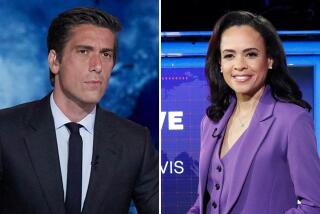Protesters throw a wild card in the mix
- Share via
New York — The planners of the Republican National Convention have crafted a minute-by-minute lineup they hope will keep viewers tuned in. But nothing they do can guarantee that TV networks won’t cut to a split screen with convention speakers on one side and protesters in the streets of New York on the other.
How much noise the protesters make could determine just what kind of TV exposure they get. Although plans for a giant primal scream have been axed, the protesters who are expected to gather here this week will still be vying to be heard, with a “die-in” in front of Madison Square Garden and an anti-Bill O’Reilly “Shut-Up-A-Thon” in front of Fox News among the planned activities. The protests could end up posing some problems for TV producers, who will feel the pressure to keep their cameras on the convention, just as they did for the Democrats in Boston.
Still, “I don’t think equal-time provisions hold when it comes to protesters and demonstrations, so if there’s news, we’ll cover it,” said Paul Mason, senior vice president for ABC News.
Some TV executives said they could envision using a split screen if the protests get particularly noisy during prime convention hours, but they called the scenario highly speculative.
Republican convention spokesman Leonardo Alcivar said he’s not worried. “We really don’t expect that protests or any other issues will get in the way of the convention,” he said.
In the past, the Republicans haven’t been shy about demanding they be treated equally to the Democrats on TV. In July 2000, then-Republican National Committee Chairman Jim Nicholson sent network news chiefs a letter demanding they air “not a minute more” of the Democratic gathering than they had of the Republicans, which were held first that year. This year, the Democrats wrapped up their convention in Boston with little getting in the way of their message. (The only exceptions were a flurry of reports over Teresa Heinz-Kerry’s remarks to a journalist to “Shove it,” and a glitch at the end, when celebratory balloons were slow to drop and CNN aired a convention producer’s expletive-laced outburst.)
ABC’s Mason, like some other TV executives, expressed skepticism that large numbers of people would rally in New York, noting that in Boston “they kind of fizzled.” Others aren’t so sure. Democratic New York City is “unfriendly territory” for Republicans and thus “has the potential for being a bigger story” than there was in Boston, said Marcy McGinnis, CBS News’ senior vice president of news coverage.
Protester websites list a diverse array of counter-convention activities during the actual event, from traditional Zen Buddhism sitting meditation to antiwar poetry readings and an attempt to line up 5,000 people in a symbolic unemployment line. One group plans to hand out 50,000 bells to “ring out the Republicans.” Another is planning a procession of 1,000 flag-draped coffins to honor fallen U.S. troops. Marches and rallies have been organized by theme days: Monday, for example, will focus on issues of economic justice and Wednesday will be a labor union gathering.
Tuesday is being billed by protesters as “A Day of Nonviolent Civil Disobedience and Direct Action.” Plans include the “die-in” at Madison Square Garden. But organizers “have axed the primal scream thing,” according to an update from NYC Anarchist Grapevine on protest websites.
Tuesday’s convention speakers include California Gov. Arnold Schwarzenegger, and ABC, CBS and NBC plan to dedicate an hour of prime-time coverage each. Those broadcasters also plan an hour of coverage Wednesday, when Vice President Dick Cheney speaks, and Thursday, the night of President George W. Bush’s speech. Protests “would have to be pretty big” to warrant cutting away from any of the prime-time speeches, said CBS’ McGinnis.
Whatever happens “is something we have to wait and see,” said Mark Lukasiewicz, executive producer of NBC News’ convention coverage. “You can’t game that out.”
“Obviously, we’re talking a lot about it but we don’t know,” said Phil Griffin, vice president of prime time for MSNBC, which like other cable networks and public television will have several hours of coverage a night. “Everyone thought there would be a lot of protests and disruptions in Boston and there was a little bit, but not a lot.”
With New York headquarters -- or, in CNN’s case, a bureau of nearly 500 staffers -- networks are better off than they were in Boston if significant news, from protests to terrorism, does happen outside the convention hall. The street scene “could be no big deal or it could be pretty significant,” said Princell Hair, executive vice president of CNN/U.S. “We’re going to prepare for the worst and adjust as we go along.”
More to Read
Get the L.A. Times Politics newsletter
Deeply reported insights into legislation, politics and policy from Sacramento, Washington and beyond. In your inbox twice per week.
You may occasionally receive promotional content from the Los Angeles Times.









